In this comprehensive guide, we'll explore 200 diverse ways to declare your love in French as a french speaker, ranging from formal declarations to casual endearments and even some cheeky slang. Whether you're penning a love letter, whispering sweet nothings, or simply wanting to surprise your French-speaking sweetheart, we've got you covered.
From the classic "Je t'aime" to "Je t'aime beaucoup" the more poetic "Tu es l'amour de ma vie," you'll discover many expressions for every romantic situation imaginable.
When is "I love you" used in French?
In French culture, saying "Je t'aime" (I love you) carries significant weight and is used more sparingly than its English counterpart. Understanding when and how to use this phrase is crucial for navigating relationships in French-speaking contexts.
-
Romantic Relationships:
-
"Je t'aime" is primarily used in romantic contexts.
-
It's typically said after a relationship has become serious and established.
-
French people often wait longer to say "Je t'aime" compared to some other cultures.
2. Family Relationships:
-
While "Je t'aime" can be used within families, it's less common than in English-speaking cultures.
-
Parents might say it to their children, but it's not an everyday expression.
-
Adult children might say it to their parents on special occasions or in emotional moments.
3. Friendships:
-
"Je t'aime" is rarely used between friends.
-
For platonic love, "Je t'aime bien" (I like you a lot) or "Je t'adore" (I adore you) are more common.
4. Frequency of Use:
-
Unlike in some cultures where "I love you" might be said daily, French people tend to use "Je t'aime" less frequently.
-
The phrase is often reserved for meaningful moments rather than casual, everyday use.
5. Cultural Nuances:
-
The French often express love through actions rather than words.
-
There's a cultural preference for subtlety and understatement in expressing emotions.
6. Contextual Differences:
-
In professional or formal settings, "Je t'aime" is never used.
-
In public, French couples might be physically affectionate but are less likely to verbally express love.
7. Regional Variations:
-
Usage can vary in different French-speaking regions. For example, in Quebec, "Je t'aime" might be used more freely, similar to English.
8. Alternatives for Early Relationships:
-
In the early stages of dating, phrases like "Je t'apprécie beaucoup" (I appreciate you a lot) or "Tu me plais" (I'm attracted to you) are more common.
9. Intensity of Meaning:
-
When "Je t'aime" is said, it often implies a deep, serious love.
-
It's not typically used casually or in the early stages of attraction.
10. Non-verbal Expressions:
-
French culture often relies on non-verbal cues to express affection, such as kisses, touches, or meaningful looks.
Examples:
-
In a long-term relationship: "Après toutes ces années, je t'aime toujours autant." (After all these years, I still love you just as much.)
-
Parent to a child: "Tu sais que je t'aime, mon chéri, même si je ne le dis pas souvent." (You know I love you, my darling, even if I don't say it often.)
-
Between friends (showing the difference): "Tu es mon meilleur ami, je t'adore !" (You're my best friend, I adore you!) Note the use of "je t'adore" instead of "je t'aime."
How to say I love you in French in 75 ways
Expressing love in French goes far beyond the simple "Je t'aime". The way you declare your love can vary greatly depending on the formality of the situation, your relationship with the person, and the depth of your feelings.
Let's explore the myriad ways to express romantic love in French, starting with formal expressions and moving on to more casual and deeply emotional ones.
Formal ways to say I love you in French

In formal situations or when expressing love in a more refined manner, these phrases can help you convey your feelings with elegance and respect.
| French Expression | English Translation | Context | IPA Pronunciation |
|---|---|---|---|
| Je vous aime | I love you | Formal, addressing someone respectfully | /ʒə vu zɛm/ |
| Je suis épris(e) de vous | I am in love with you | Formal, expressing deep affection | /ʒə sɥi epʁi də vu/ |
| Mon cœur vous appartient | My heart belongs to you | Formal, poetic declaration | /mɔ̃ kœʁ vu zapaʁtjɛ̃/ |
| Vous êtes l'amour de ma vie | You are the love of my life | Formal, expressing lifelong commitment | /vu zɛt lamuʁ də ma vi/ |
| Je vous chéris | I cherish you | Formal, expressing deep affection | /ʒə vu ʃeʁi/ |
| Vous êtes ma raison d'être | You are my reason for being | Formal, poetic expression | /vu zɛt ma ʁɛzɔ̃ dɛtʁ/ |
| Je ne peux vivre sans vous | I cannot live without you | Formal, expressing deep dependence | /ʒə nə pø vivʁ sɑ̃ vu/ |
| Vous êtes tout pour moi | You are everything to me | Formal, expressing complete devotion | /vu zɛt tu puʁ mwa/ |
| Je vous adore | I adore you | Formal, expressing strong affection | /ʒə vu zadɔʁ/ |
| Mon amour pour vous est éternel | My love for you is eternal | Formal, expressing everlasting love | /mɔ̃n‿amuʁ puʁ vu ɛt‿etɛʁnɛl/ |
| Je suis comblé(e) par votre amour | I am fulfilled by your love | Formal, expressing gratitude for love | /ʒə sɥi kɔ̃ble paʁ vɔtʁ‿amuʁ/ |
| Vous illuminez ma vie | You light up my life | Formal, poetic expression | /vu zilyminez ma vi/ |
| Je vous porte dans mon cœur | I carry you in my heart | Formal, expressing constant thought | /ʒə vu pɔʁt dɑ̃ mɔ̃ kœʁ/ |
| Vous êtes ma moitié | You are my other half | Formal, expressing completeness | /vu zɛt ma mwatje/ |
| Je suis à vous pour toujours | I am yours forever | Formal, expressing eternal commitment | /ʒə sɥiz‿a vu puʁ tuʒuʁ/ |
Examples and explanations:
-
In a love letter: Je suis épris(e) de vous et je ne peux imaginer ma vie sans votre présence. " ( I am in love with you and I cannot imagine my life without your presence. This formal declaration combines deep affection with a sense of dependency, suitable for expressing serious romantic intentions.
-
During a marriage proposal: Vous êtes l'amour de ma vie. Voulez-vous m'épouser? " ( You are the love of my life. Will you marry me? This combines a formal love declaration with the ultimate question, emphasizing the depth and seriousness of the feelings involved.
-
In a formal anniversary card: Mon cœur vous appartient, aujourd'hui et pour toujours. " ( My heart belongs to you, today and forever.
This poetic expression is perfect for reaffirming love in long-term, committed relationships.
Casual and everyday I love you expressions in French
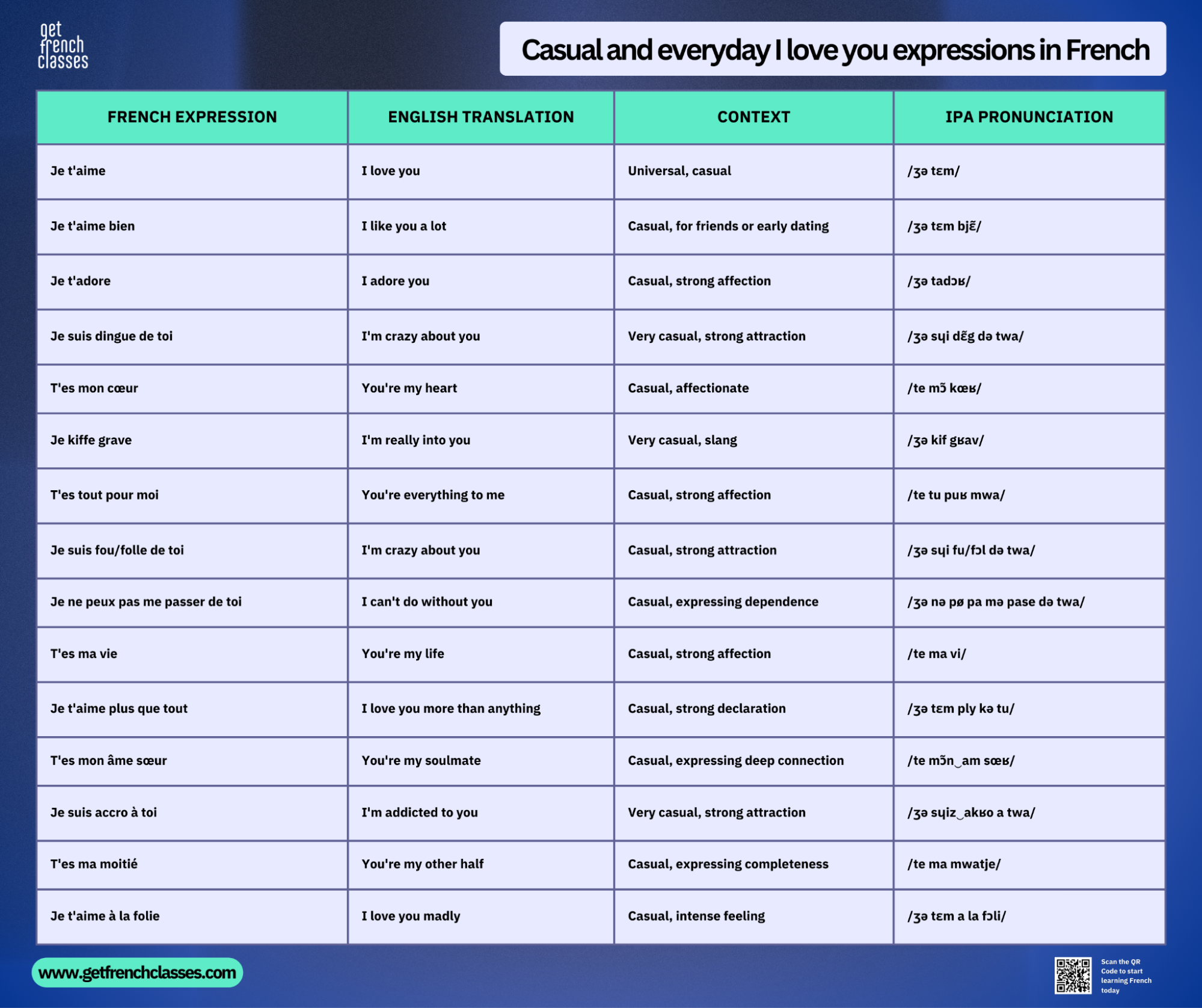
How to Say "I Love You" in French | French Lessons

For everyday situations with a romantic partner, family, or close friends, these more relaxed expressions can help you express love naturally and frequently.
| Column A | New Column 1 | New Column | Column B |
|---|---|---|---|
| Je t'aime | I love you | Universal, casual | /ʒə tɛm/ |
| Je t'aime bien | I like you a lot | Casual, for friends or early dating | /ʒə tɛm bjɛ̃/ |
| Je t'adore | I adore you | Casual, strong affection | /ʒə tadɔʁ/ |
| Je suis dingue de toi | I'm crazy about you | Very casual, strong attraction | /ʒə sɥi dɛ̃g də twa/ |
| T'es mon cœur | You're my heart | Casual, affectionate | /te mɔ̃ kœʁ/ |
| Je kiffe grave | I'm really into you | Very casual, slang | /ʒə kif gʁav/ |
| T'es tout pour moi | You're everything to me | Casual, strong affection | /te tu puʁ mwa/ |
| Je suis fou/folle de toi | I'm crazy about you | Casual, strong attraction | /ʒə sɥi fu/fɔl də twa/ |
| Je ne peux pas me passer de toi | I can't do without you | Casual, expressing dependence | /ʒə nə pø pa mə pase də twa/ |
| T'es ma vie | You're my life | Casual, strong affection | /te ma vi/ |
| Je t'aime plus que tout | I love you more than anything | Casual, strong declaration | /ʒə tɛm ply kə tu/ |
| T'es mon âme sœur | You're my soulmate | Casual, expressing deep connection | /te mɔ̃n‿am sœʁ/ |
| Je suis accro à toi | I'm addicted to you | Very casual, strong attraction | /ʒə sɥiz‿akʁo a twa/ |
| T'es ma moitié | You're my other half | Casual, expressing completeness | /te ma mwatje/ |
| Je t'aime à la folie | I love you madly | Casual, intense feeling | /ʒə tɛm a la fɔli/ |
Examples and explanations:
-
Greeting your partner in the morning: Bonjour mon cœur, je t'aime tellement. " ( Good morning my heart, I love you so much.)
This casual, affectionate greeting combines a term of endearment with a simple love declaration, perfect for everyday use.
2. Texting a new romantic interest: Je t'aime bien, on se voit ce soir? " ( I like you a lot, shall we see each other tonight? Using "Je t'aime bien" early in a relationship or with someone you're just starting to date shows affection without the intensity of "Je t'aime."
3. Expressing strong feelings to a partner: Je suis dingue de toi, tu le sais? " ( I'm crazy about you, you know that?
This casual, intense expression is great for emphasizing strong attraction or infatuation in established relationships.
Expressing deep love in French
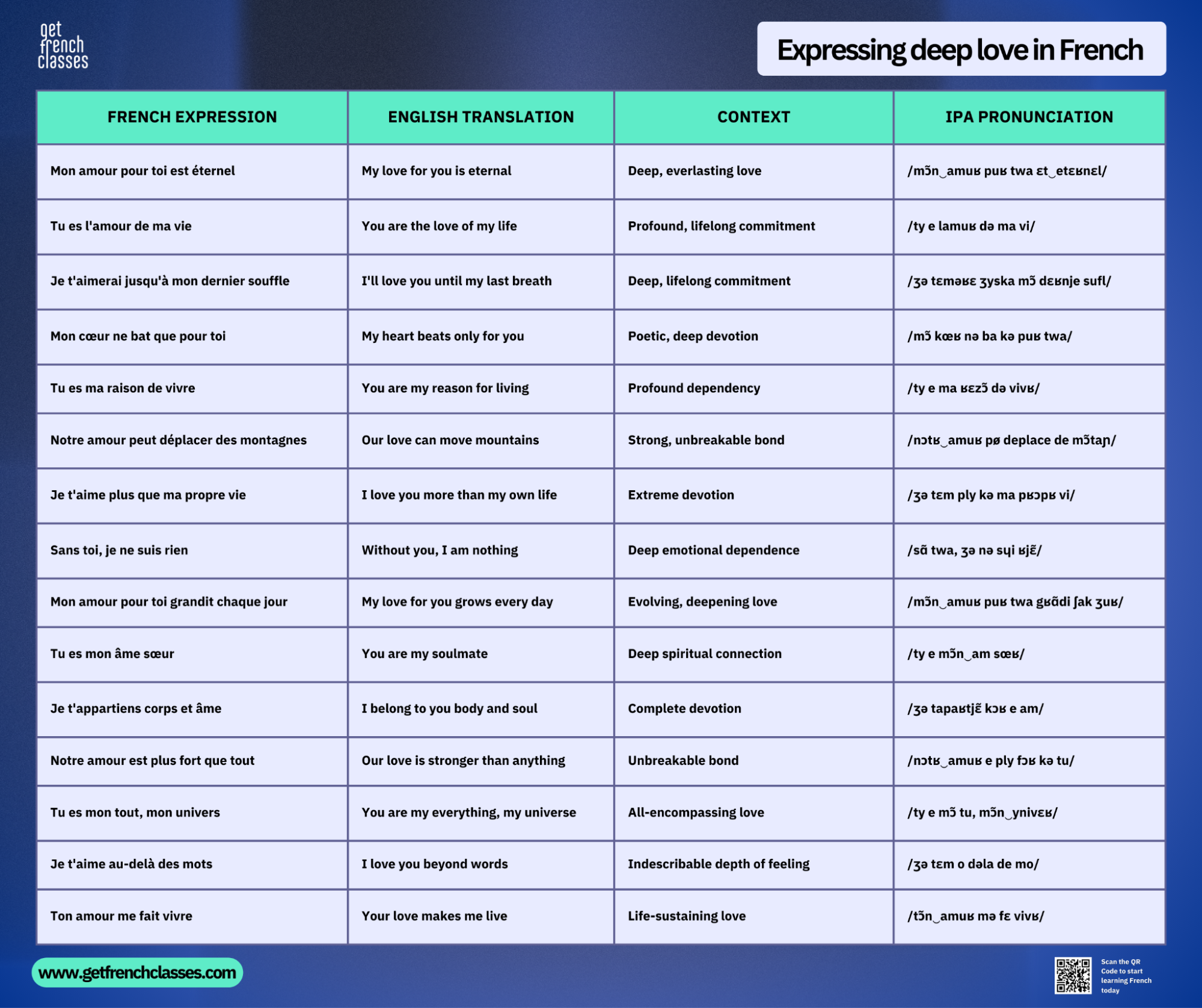
When you want to convey profound emotions or undying love, these heartfelt expressions can help you articulate the depth of your feelings. Make sure to pronounce the words as they are made up, and repeat them over and over to improve your French pronunciation as well as your French speaking skills.
| French Expression | English Translation | Context | IPA Pronunciation |
|---|---|---|---|
| Mon amour pour toi est éternel | My love for you is eternal | Deep, everlasting love | /mɔ̃n‿amuʁ puʁ twa ɛt‿etɛʁnɛl/ |
| Tu es l'amour de ma vie | You are the love of my life | Profound, lifelong commitment | /ty e lamuʁ də ma vi/ |
| Je t'aimerai jusqu'à mon dernier souffle | I'll love you until my last breath | Deep, lifelong commitment | /ʒə tɛməʁɛ ʒyska mɔ̃ dɛʁnje sufl/ |
| Mon cœur ne bat que pour toi | My heart beats only for you | Poetic, deep devotion | /mɔ̃ kœʁ nə ba kə puʁ twa/ |
| Tu es ma raison de vivre | You are my reason for living | Profound dependency | /ty e ma ʁɛzɔ̃ də vivʁ/ |
| Notre amour peut déplacer des montagnes | Our love can move mountains | Strong, unbreakable bond | /nɔtʁ‿amuʁ pø deplace de mɔ̃taɲ/ |
| Je t'aime plus que ma propre vie | I love you more than my own life | Extreme devotion | /ʒə tɛm ply kə ma pʁɔpʁ vi/ |
| Sans toi, je ne suis rien | Without you, I am nothing | Deep emotional dependence | /sɑ̃ twa, ʒə nə sɥi ʁjɛ̃/ |
| Mon amour pour toi grandit chaque jour | My love for you grows every day | Evolving, deepening love | /mɔ̃n‿amuʁ puʁ twa gʁɑ̃di ʃak ʒuʁ/ |
| Tu es mon âme sœur | You are my soulmate | Deep spiritual connection | /ty e mɔ̃n‿am sœʁ/ |
| Je t'appartiens corps et âme | I belong to you body and soul | Complete devotion | /ʒə tapaʁtjɛ̃ kɔʁ e am/ |
| Notre amour est plus fort que tout | Our love is stronger than anything | Unbreakable bond | /nɔtʁ‿amuʁ e ply fɔʁ kə tu/ |
| Tu es mon tout, mon univers | You are my everything, my universe | All-encompassing love | /ty e mɔ̃ tu, mɔ̃n‿ynivɛʁ/ |
| Je t'aime au-delà des mots | I love you beyond words | Indescribable depth of feeling | /ʒə tɛm o dəla de mo/ |
| Ton amour me fait vivre | Your love makes me live | Life-sustaining love | /tɔ̃n‿amuʁ mə fɛ vivʁ/ |
Examples and cultural context:
-
In a wedding vow: Je t'aimerai jusqu'à mon dernier souffle, tu es l'amour de ma vie. " ( I'll love you until my last breath, you are the love of my life. This combination of expressions conveys a deep, lifelong commitment, perfect for momentous occasions like weddings.
-
During a heartfelt reconciliation: Sans toi, je ne suis rien. Notre amour est plus fort que tout. " ( Without you, I am nothing. Our love is stronger than anything. These phrases express deep emotional dependence and the strength of the relationship, suitable for reaffirming love after challenges.
-
In a romantic letter:
Mon cœur ne bat que pour toi, tu es ma raison de vivre. " ( My heart beats only for you, you are my reason for living.
This poetic declaration combines physical and emotional devotion, expressing a profound and all-encompassing love.
French love slang and youth expressions
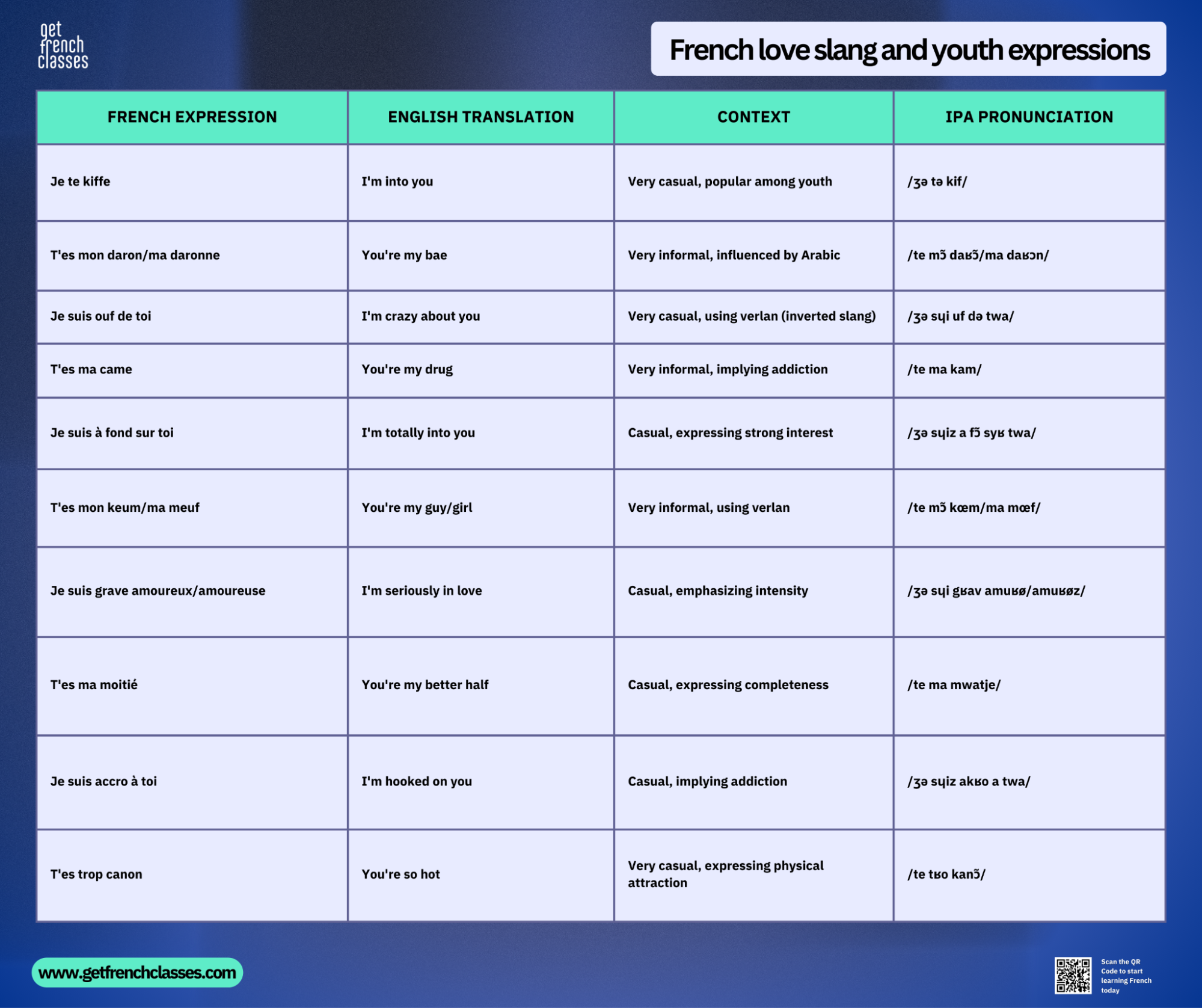
Young French speakers often use slang expressions to declare their love or attraction. These are informal and should be used carefully, as they may not be appropriate in all contexts.
| French Expression | English Translation | Context | IPA Pronunciation |
|---|---|---|---|
| Je te kiffe | I'm into you | Very casual, popular among youth | /ʒə tə kif/ |
| T'es mon daron/ma daronne | You're my bae | Very informal, influenced by Arabic | /te mɔ̃ daʁɔ̃/ma daʁɔn/ |
| Je suis ouf de toi | I'm crazy about you | Very casual, using verlan (inverted slang) | /ʒə sɥi uf də twa/ |
| T'es ma came | You're my drug | Very informal, implying addiction | /te ma kam/ |
| Je suis à fond sur toi | I'm totally into you | Casual, expressing strong interest | /ʒə sɥiz a fɔ̃ syʁ twa/ |
| T'es mon keum/ma meuf | You're my guy/girl | Very informal, using verlan | /te mɔ̃ kœm/ma mœf/ |
| Je suis grave amoureux/amoureuse | I'm seriously in love | Casual, emphasizing intensity | /ʒə sɥi gʁav amuʁø/amuʁøz/ |
| T'es ma moitié | You're my better half | Casual, expressing completeness | /te ma mwatje/ |
| Je suis accro à toi | I'm hooked on you | Casual, implying addiction | /ʒə sɥiz akʁo a twa/ |
| T'es trop canon | You're so hot | Very casual, expressing physical attraction | /te tʁo kanɔ̃/ |
Usage examples and generational context:
-
Texting a crush: Je te kiffe grave, on se fait un ciné ce soir ? " ( I'm really into you, want to catch a movie tonight?
This expression is very popular among teenagers and young adults, especially in text messages or casual conversations.
2. Expressing strong feelings to a partner: T'es ma came, je suis ouf de toi ! " ( You're my drug, I'm crazy about you! This combination of slang terms is used by younger generations to express intense attraction or infatuation.
3. Complimenting someone's appearance:
Waouh, t'es trop canon aujourd'hui ! " ( Wow, you're so hot today!) This is a very casual way to compliment someone's looks, typically used by younger people in informal settings.
Remember, these expressions evolve quickly and can vary by region. They're generally not appropriate for formal situations or with older generations.
Regional ways to say I love you in French-speaking countries
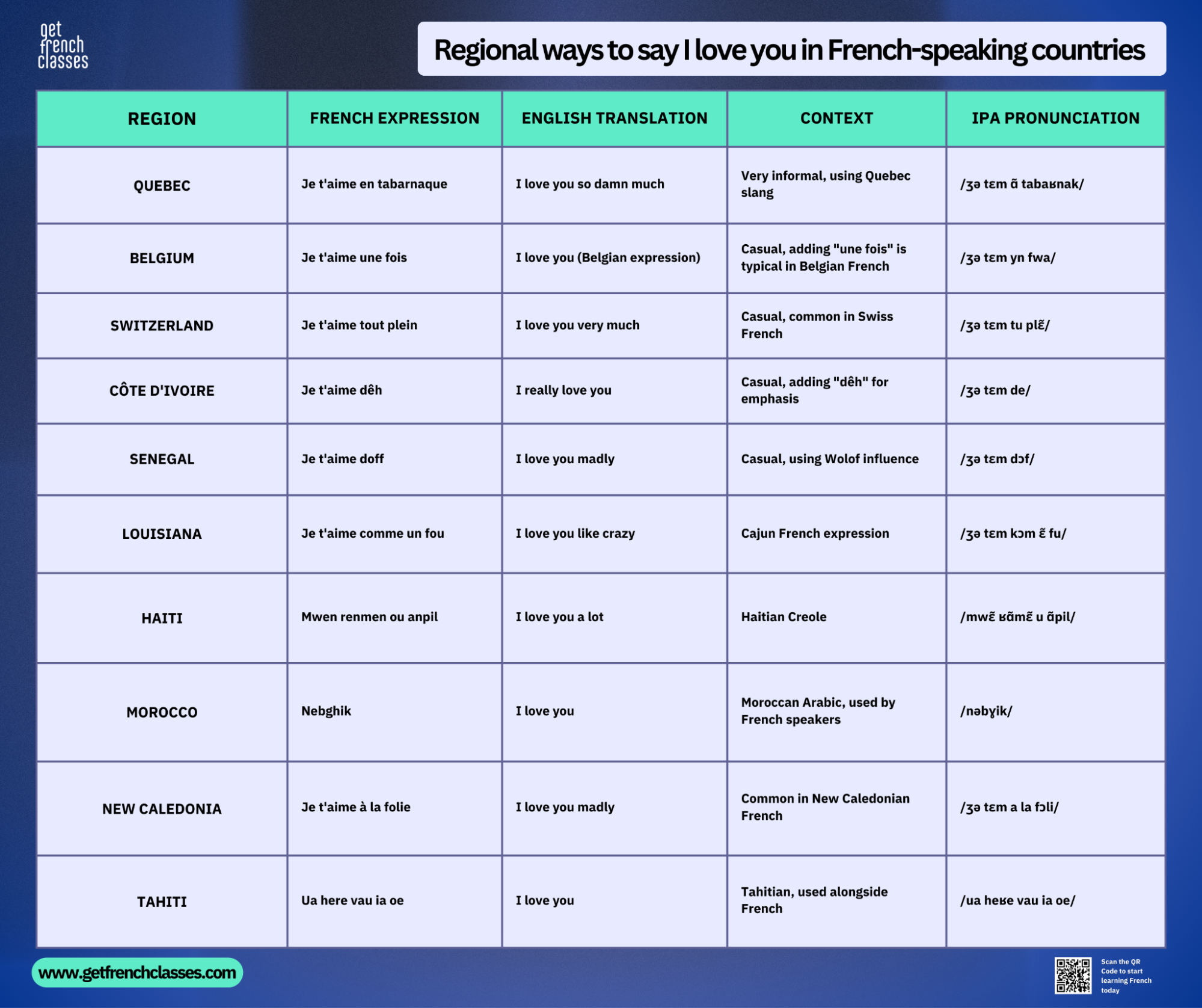
French is spoken in many countries around the world, and each region has developed its own unique love expressions. Let's explore some ways to say "I love you" in different Francophone regions.
| Region | French Expression | English Translation | Context | IPA Pronunciation |
|---|---|---|---|---|
| Quebec | Je t'aime en tabarnaque | I love you so damn much | Very informal, using Quebec slang | /ʒə tɛm ɑ̃ tabaʁnak/ |
| Belgium | Je t'aime une fois | I love you (Belgian expression) | Casual, adding "une fois" is typical in Belgian French | /ʒə tɛm yn fwa/ |
| Switzerland | Je t'aime tout plein | I love you very much | Casual, common in Swiss French | /ʒə tɛm tu plɛ̃/ |
| Côte d'Ivoire | Je t'aime dêh | I really love you | Casual, adding "dêh" for emphasis | /ʒə tɛm de/ |
| Senegal | Je t'aime doff | I love you madly | Casual, using Wolof influence | /ʒə tɛm dɔf/ |
| Louisiana | Je t'aime comme un fou | I love you like crazy | Cajun French expression | /ʒə tɛm kɔm ɛ̃ fu/ |
| Haiti | Mwen renmen ou anpil | I love you a lot | Haitian Creole | /mwɛ̃ ʁɑ̃mɛ̃ u ɑ̃pil/ |
| Morocco | Nebghik | I love you | Moroccan Arabic, used by French speakers | /nəbɣik/ |
| New Caledonia | Je t'aime à la folie | I love you madly | Common in New Caledonian French | /ʒə tɛm a la fɔli/ |
| Tahiti | Ua here vau ia oe | I love you | Tahitian, used alongside French | /ua heʁe vau ia oe/ |
Examples and cultural insights:
-
In Quebec: Je t'aime en tabarnaque, mon amour ! " ( I love you so damn much, my love!
This expression uses the quintessential Quebec swear word "tabarnaque" to emphasize the intensity of love. It's very informal and should be used cautiously.
-
In Belgium: Je t'aime une fois, tu sais ! " ( I love you, you know!) Adding "une fois" (literally "one time") is a typical Belgian way to speak French. It doesn't change the meaning but adds a local flavor.
-
In Senegal: Je t'aime doff, mon chéri. " ( I love you madly, my darling.
"Doff" comes from Wolof, one of Senegal's local languages, and means "crazy" or "mad". This mix of French and local language is common in many African French-speaking countries.
Saying I love you in specific situations
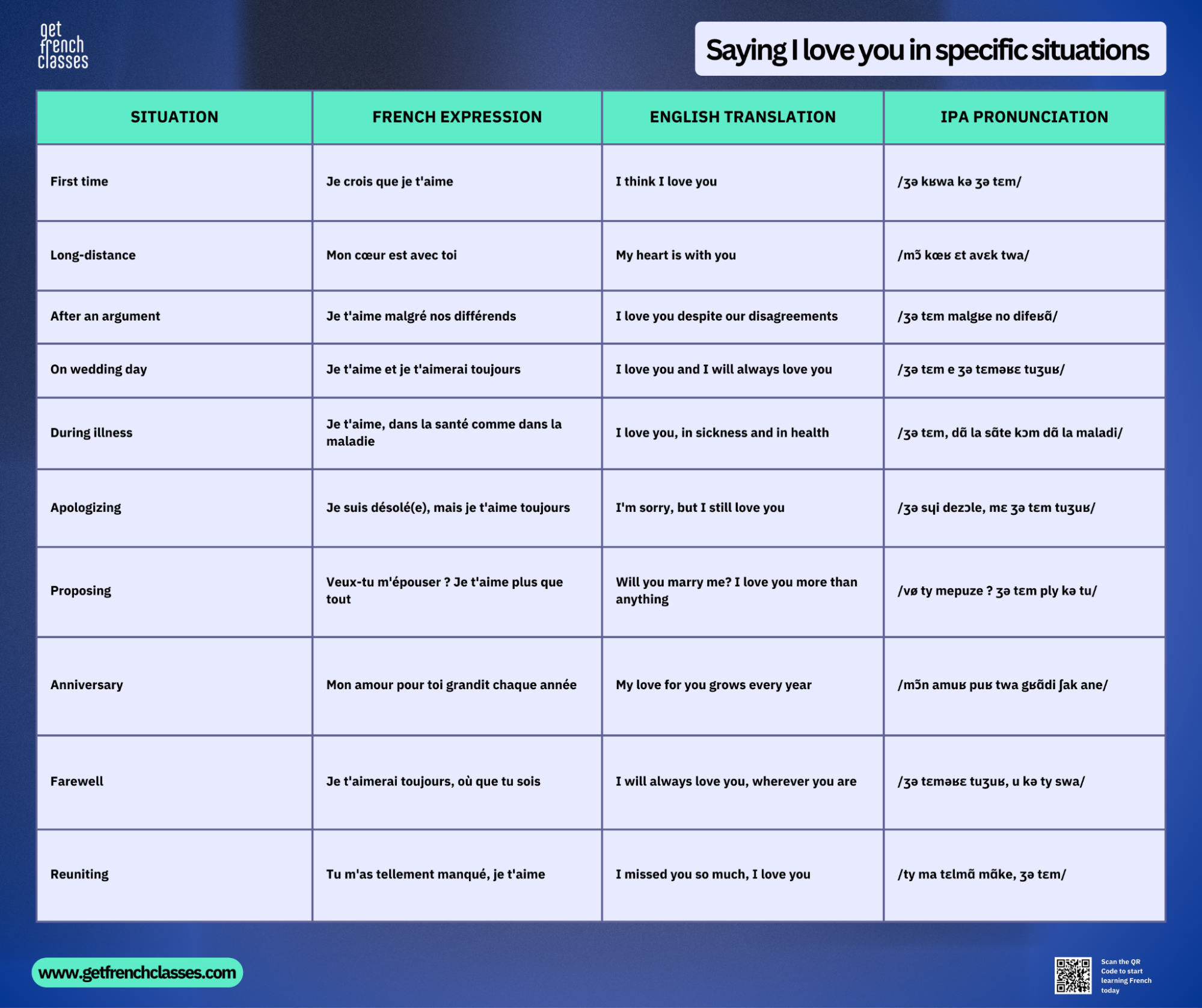
Different situations call for different ways of expressing love in French. Here are some expressions tailored for specific contexts.
| Situation | French Expression | English Translation | IPA Pronunciation |
|---|---|---|---|
| First time | Je crois que je t'aime | I think I love you | /ʒə kʁwa kə ʒə tɛm/ |
| Long-distance | Mon cœur est avec toi | My heart is with you | /mɔ̃ kœʁ ɛt avɛk twa/ |
| After an argument | Je t'aime malgré nos différends | I love you despite our disagreements | /ʒə tɛm malgʁe no difeʁɑ̃/ |
| On wedding day | Je t'aime et je t'aimerai toujours | I love you and I will always love you | /ʒə tɛm e ʒə tɛməʁɛ tuʒuʁ/ |
| During illness | Je t'aime, dans la santé comme dans la maladie | I love you, in sickness and in health | /ʒə tɛm, dɑ̃ la sɑ̃te kɔm dɑ̃ la maladi/ |
| Apologizing | Je suis désolé(e), mais je t'aime toujours | I'm sorry, but I still love you | /ʒə sɥi dezɔle, mɛ ʒə tɛm tuʒuʁ/ |
| Proposing | Veux-tu m'épouser ? Je t'aime plus que tout | Will you marry me? I love you more than anything | /vø ty mepuze ? ʒə tɛm ply kə tu/ |
| Anniversary | Mon amour pour toi grandit chaque année | My love for you grows every year | /mɔ̃n amuʁ puʁ twa gʁɑ̃di ʃak ane/ |
| Farewell | Je t'aimerai toujours, où que tu sois | I will always love you, wherever you are | /ʒə tɛməʁɛ tuʒuʁ, u kə ty swa/ |
| Reuniting | Tu m'as tellement manqué, je t'aime | I missed you so much, I love you | /ty ma tɛlmɑ̃ mɑ̃ke, ʒə tɛm/ |
Examples and etiquette tips:
-
Saying "I love you" for the first time: Je crois que je t'aime... Non, j'en suis sûr(e). " ( I think I love you... No, I'm sure of it.
Etiquette tip : In French culture, saying "I love you" is often seen as a serious declaration. It's common to build up to it gradually, hence starting with "Je crois que" (I think that).
2. During a long-distance relationship: Même si nous sommes loin l'un de l'autre, mon cœur est avec toi. " ( Even if we're far from each other, my heart is with you.
Etiquette tip : French people often appreciate poetic declarations. Using metaphors like this can make your long-distance communication more romantic.
3. After an argument:
Nous avons nos différends, mais je t'aime toujours. " ( We have our disagreements, but I still love you.
Etiquette tip : In French culture, it's important to acknowledge the issue while reaffirming your love. This balanced approach is often appreciated.
Expressing love in written French
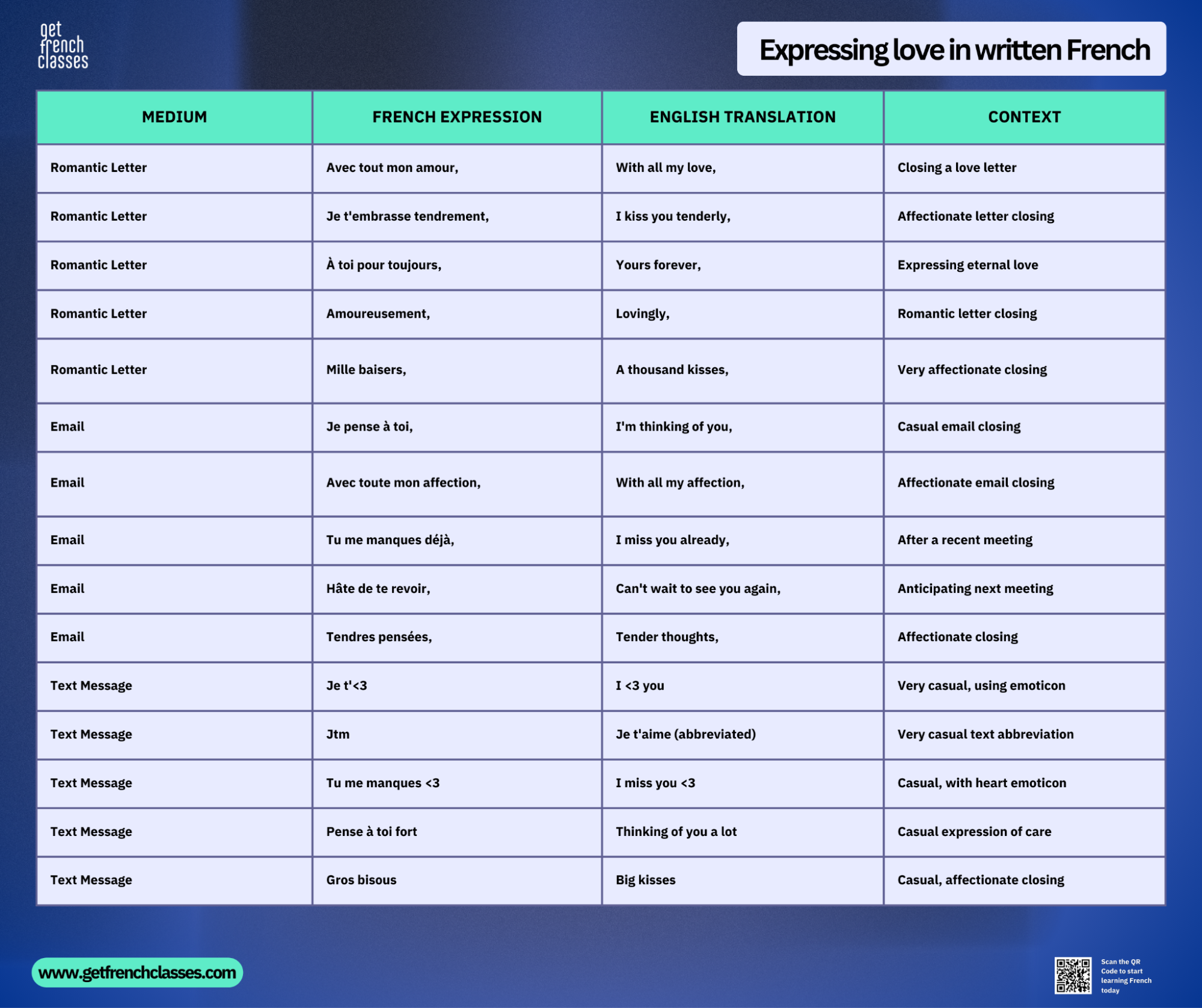
Written expressions of love in French can be beautifully poetic and romantic. Whether you're closing a love letter, sending an email, or crafting the perfect text message, here are some ways to express your feelings in writing.
| Medium | French Expression | English Translation | Context |
|---|---|---|---|
| Romantic Letter | Avec tout mon amour, | With all my love, | Closing a love letter |
| Romantic Letter | Je t'embrasse tendrement, | I kiss you tenderly, | Affectionate letter closing |
| Romantic Letter | À toi pour toujours, | Yours forever, | Expressing eternal love |
| Romantic Letter | Amoureusement, | Lovingly, | Romantic letter closing |
| Romantic Letter | Mille baisers, | A thousand kisses, | Very affectionate closing |
| Je pense à toi, | I'm thinking of you, | Casual email closing | |
| Avec toute mon affection, | With all my affection, | Affectionate email closing | |
| Tu me manques déjà, | I miss you already, | After a recent meeting | |
| Hâte de te revoir, | Can't wait to see you again, | Anticipating next meeting | |
| Tendres pensées, | Tender thoughts, | Affectionate closing | |
| Text Message | Je t'<3 | I <3 you | Very casual, using emoticon |
| Text Message | Jtm | Je t'aime (abbreviated) | Very casual text abbreviation |
| Text Message | Tu me manques <3 | I miss you <3 | Casual, with heart emoticon |
| Text Message | Pense à toi fort | Thinking of you a lot | Casual expression of care |
| Text Message | Gros bisous | Big kisses | Casual, affectionate closing |
Examples and usage tips:
-
Closing a romantic letter: Mon amour, Les mots me manquent pour exprimer à quel point tu comptes pour moi. Chaque jour passé à tes côtés est un cadeau. Avec tout mon amour, [Your Name] My love, Words fail me to express how much you mean to me. Every day spent by your side is a gift. With all my love, [Your Name] Usage tip : In formal love letters, it's common to use more poetic and elaborate expressions. The closing should match the tone of the letter.
-
Ending a romantic email: Mon chéri, J'espère que ta journée se passe bien. Je ne cesse de penser à notre weekend ensemble. Tu illumines ma vie. Hâte de te revoir, [Your Name] My darling, I hope your day is going well. I can't stop thinking about our weekend together. You light up my life. Can't wait to see you again, [Your Name] Usage tip : Emails can be less formal than letters, but still maintain a romantic tone. It's nice to reference shared experiences or future plans. Use "Ma chérie" for the feminine form.
-
Sending a loving text message: Bonjour mon cœur ! Juste un petit message pour te dire que je pense à toi. Tu me manques <3 Gros bisous ! Good morning my heart! Just a little message to tell you I'm thinking of you. I miss you <3 Big kisses! Usage tip : Text messages are usually very casual. It's common to use abbreviations, emoticons, and less formal language. However, the level of casualness should still match your relationship dynamic.
How to say "My Love" in French
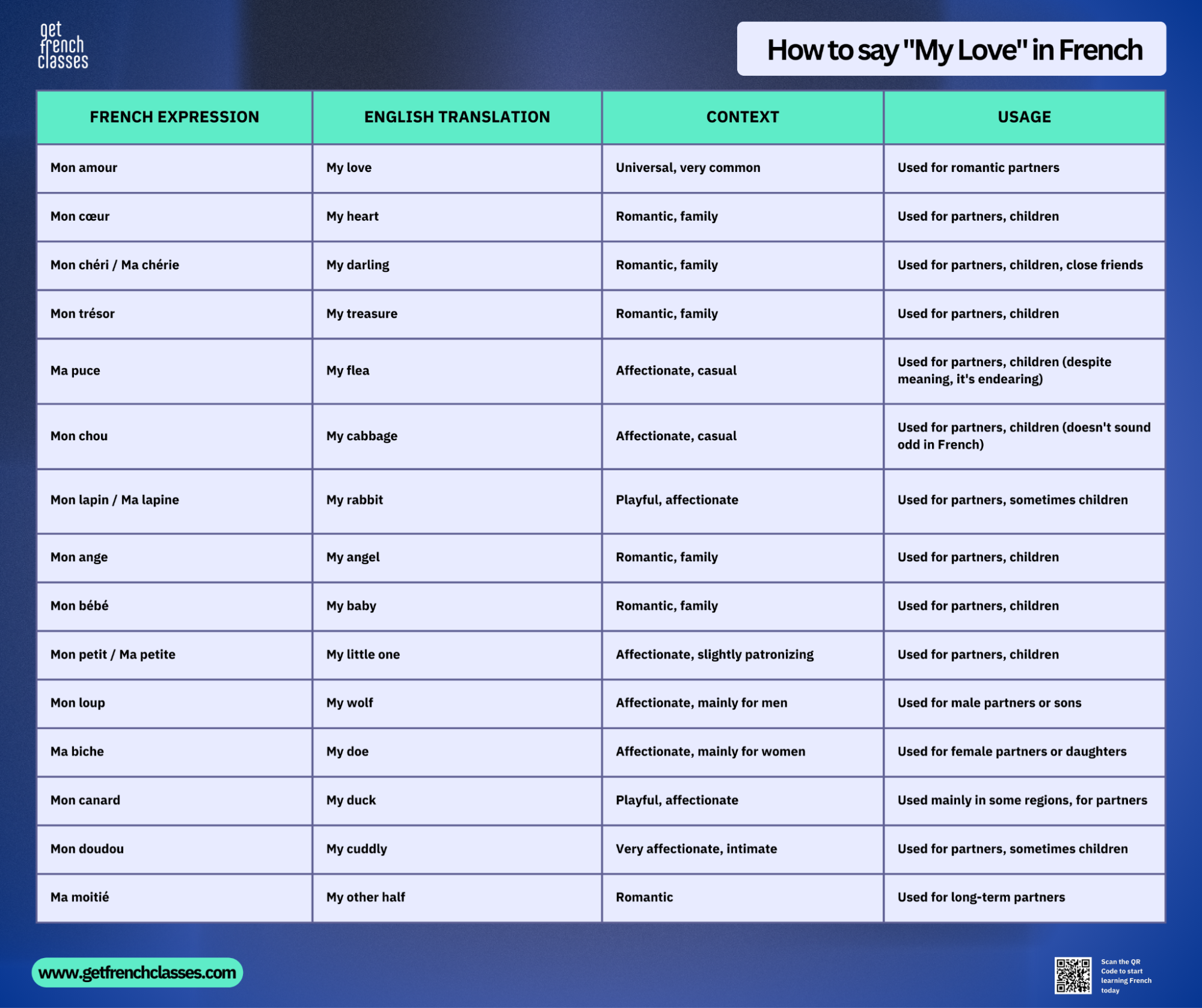
French is known for its abundance of affectionate pet names and terms of endearment. These expressions can add warmth and intimacy to your relationships.
| French Expression | English Translation | Context | Usage |
|---|---|---|---|
| Mon amour | My love | Universal, very common | Used for romantic partners |
| Mon cœur | My heart | Romantic, family | Used for partners, children |
| Mon chéri / Ma chérie | My darling | Romantic, family | Used for partners, children, close friends |
| Mon trésor | My treasure | Romantic, family | Used for partners, children |
| Ma puce | My flea | Affectionate, casual | Used for partners, children (despite meaning, it's endearing) |
| Mon chou | My cabbage | Affectionate, casual | Used for partners, children (doesn't sound odd in French) |
| Mon lapin / Ma lapine | My rabbit | Playful, affectionate | Used for partners, sometimes children |
| Mon ange | My angel | Romantic, family | Used for partners, children |
| Mon bébé | My baby | Romantic, family | Used for partners, children |
| Mon petit / Ma petite | My little one | Affectionate, slightly patronizing | Used for partners, children |
| Mon loup | My wolf | Affectionate, mainly for men | Used for male partners or sons |
| Ma biche | My doe | Affectionate, mainly for women | Used for female partners or daughters |
| Mon canard | My duck | Playful, affectionate | Used mainly in some regions, for partners |
| Mon doudou | My cuddly | Very affectionate, intimate | Used for partners, sometimes children |
| Ma moitié | My other half | Romantic | Used for long-term partners |
Examples and usage tips:
-
Greeting your partner in the morning: Bonjour mon amour, bien dormi ? Good morning my love, did you sleep well? This is a very common and universally accepted way to address a romantic partner.
-
Comforting a child: Ne pleure pas, mon trésor. Tout ira bien. " ( Don't cry, my treasure. Everything will be alright .) Terms like "mon trésor" or "mon cœur" are often used for children as well as romantic partners.
-
Playful conversation with a partner: Tu es si mignon, mon petit chou ! " ( You're so cute, my little cabbage! Despite the literal translations, these food-related terms are considered cute and affectionate in French.
How to say I like you in French
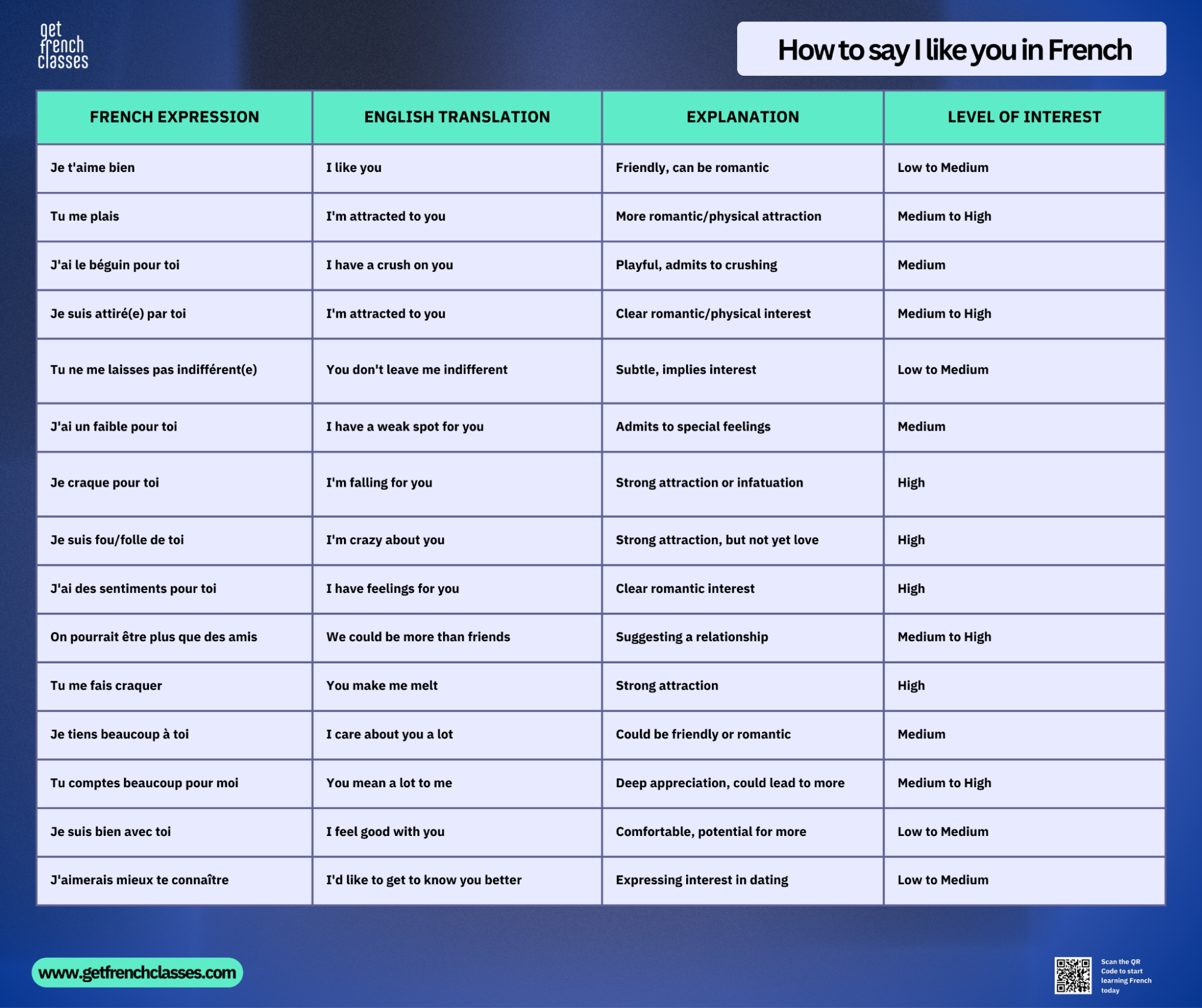
Expressing romantic interest before declaring love can be tricky in any language. In French, there are several ways to convey that you like someone without saying "Je t'aime" (I love you), which is considered very serious.
| French Expression | English Translation | Explanation | Level of Interest |
|---|---|---|---|
| Je t'aime bien | I like you | Friendly, can be romantic | Low to Medium |
| Tu me plais | I'm attracted to you | More romantic/physical attraction | Medium to High |
| J'ai le béguin pour toi | I have a crush on you | Playful, admits to crushing | Medium |
| Je suis attiré(e) par toi | I'm attracted to you | Clear romantic/physical interest | Medium to High |
| Tu ne me laisses pas indifférent(e) | You don't leave me indifferent | Subtle, implies interest | Low to Medium |
| J'ai un faible pour toi | I have a weak spot for you | Admits to special feelings | Medium |
| Je craque pour toi | I'm falling for you | Strong attraction or infatuation | High |
| Je suis fou/folle de toi | I'm crazy about you | Strong attraction, but not yet love | High |
| J'ai des sentiments pour toi | I have feelings for you | Clear romantic interest | High |
| On pourrait être plus que des amis | We could be more than friends | Suggesting a relationship | Medium to High |
| Tu me fais craquer | You make me melt | Strong attraction | High |
| Je tiens beaucoup à toi | I care about you a lot | Could be friendly or romantic | Medium |
| Tu comptes beaucoup pour moi | You mean a lot to me | Deep appreciation, could lead to more | Medium to High |
| Je suis bien avec toi | I feel good with you | Comfortable, potential for more | Low to Medium |
| J'aimerais mieux te connaître | I'd like to get to know you better | Expressing interest in dating | Low to Medium |
Examples and cultural nuances:
-
Early stages of dating: Tu me plais beaucoup. On pourrait dîner ensemble ce weekend ? " ( I'm very attracted to you. Could we have dinner together this weekend? This is more direct than "Je t'aime bien" and clearly expresses romantic interest without the seriousness of "Je t'aime."
-
Confessing a crush to a friend: J'ai le béguin pour toi depuis un moment. Ça te dirait qu'on essaie d'être plus que des amis ? " ( I've had a crush on you for a while. How would you feel about trying to be more than friends? This playful expression acknowledges feelings while leaving room for the other person to respond.
-
Expressing growing feelings: Je craque pour toi. J'adore chaque moment qu'on passe ensemble. " ( I'm falling for you. I love every moment we spend together. This shows strong attraction without the full commitment of "Je t'aime."
Cultural nuances:
-
French culture often values subtlety in romantic expressions. Starting with milder phrases and gradually increasing intensity is common.
-
Physical attraction is more openly expressed in French culture compared to some others. Phrases like "Tu me plais" are common and not considered too forward.
-
The French often appreciate wordplay and poetic expressions. Using more elaborate phrases can be seen as charming.
-
Be aware that "Je t'aime bien" can be confusing as it's often used for platonic affection. If you're expressing romantic interest, it's better to use clearer phrases.
French love quotes and sayings
French literature and culture are rich with romantic expressions. Here are some famous quotes and sayings about love, along with their translations:
-
"La vie est une fleur dont l'amour est le miel." - Victor Hugo
Translation: "Life is a flower of which love is the honey."
-
"Il n'y a qu'un bonheur dans la vie, c'est d'aimer et d'être aimé." - George Sand
Translation: "There is only one happiness in life, to love and be loved."
-
"Aimer, ce n'est pas se regarder l'un l'autre, c'est regarder ensemble dans la même direction." - Antoine de Saint-Exupéry
Translation: "Love doesn't mean gazing at each other, but looking, together, in the same direction."
-
"L'amour est l'emblème de l'éternité, il confond toute la notion de temps, efface toute la mémoire d'un commencement, toute la crainte d'une extrémité." - Madame de Staël
Translation: "Love is the emblem of eternity; it confounds all notion of time, effaces all memory of a beginning, all fear of an end."
Romantic sayings:
-
"Avoir le coup de foudre" - To fall in love at first sight (literally: to be struck by lightning)
-
"Faire les yeux doux" - To make eyes at someone (to flirt with loving glances)
-
"Vivre d'amour et d'eau fraîche" - To live on love alone (literally: to live on love and fresh water)
These quotes and sayings reflect the French cultural emphasis on passionate, all-encompassing love, and the poetic way in which it's often expressed.
French love songs
French music has a long tradition of romantic ballads and love songs. Here are some popular French love songs that have captured hearts over the years:
1 - "La Vie en Rose" by Édith Piaf

This iconic song is about seeing life through rose-colored glasses when in love. It's become synonymous with French romance worldwide.
2 - "Je t'aime... moi non plus" by Serge Gainsbourg and Jane Birkin A controversial song upon its release, it's known for its frankness about physical love.

3 - "Ne me quitte pas" by Jacques Brel

A powerful, emotionally charged plea not to be left by a lover.
4 - "Pour que tu m'aimes encore" by Céline Dion

A more modern ballad about doing anything to keep a lover's affection.
5 - "Je suis malade" by Serge Lama

This song dramatically describes the all-consuming nature of passionate love.
These songs often reflect aspects of French love culture, such as:
-
Intensity of emotion: French love songs tend to be passionate and dramatic.
-
Poetic lyrics: They often use metaphorical language to describe love.
-
Candidness: Some songs are quite frank about physical aspects of love.
-
Melancholy: Many French love songs have a touch of sadness or longing.
The tradition of the French chanson, with its emphasis on lyrics and emotional delivery, has shaped how love is expressed in French popular music.
How to say I love you in French FAQ
Is "Je t'aime" only used for romantic love?
While "Je t'aime" is most commonly used for romantic love, it can also be used for family members and very close friends. However, it's used more sparingly than "I love you" in English, especially outside of romantic contexts.
How do French people typically respond to "Je t'aime"?
Common responses include:
-
"Moi aussi" (Me too)
-
"Je t'aime aussi" (I love you too)
-
"Moi aussi, je t'aime" (I love you too) For newer relationships, a smile or kiss might be more common than a verbal response.
Is there a difference between "Je t'aime" and "Je t'aime bien"?
Yes, a significant one. "Je t'aime" expresses romantic love, while "Je t'aime bien" means "I like you" or "I'm fond of you" and is used for friends or people you're not romantically interested in.
How soon do French couples typically say "Je t'aime"?
There's no set timeline, but generally, French people tend to say it later in the relationship compared to some cultures. It's often seen as a serious declaration of committed love.
Are there any cultural taboos around saying "I love you" in French?
It's generally considered inappropriate to say "Je t'aime" too early in a relationship or to people you're not very close to. Overuse can be seen as insincere.
How do you express love to family members in French?
While Je t'aime can be used, it's less common than in some cultures. Often, love is expressed through actions or softer phrases like "Je t'adore" (I adore you) or "Je tiens à toi" (I care for you). Or "je t'aime beaucoup" (I love you so much), or the casual "Je t'aime tellement" (I love you so much). In a deeper context where the person means the world to one, you may hear a French speaker say "Je t'aime pour toujours" (I love you forever).
Is "Je t'aime" used the same way in all French-speaking countries?
While universally understood, usage can vary. In Quebec, for instance, "Je t'aime" might be used more freely, similar to English "I love you".
How do you say "I'm in love with you" in French?
"Je suis amoureux de toi" (for a male speaker) or "Je suis amoureuse de toi, est-ce que tu m'aimes?" (for a female speaker).
Are there any funny or unusual ways to say "I love you" in French slang?
Yes, some playful expressions include:
-
"J'ai le béguin pour toi" (I have a crush on you)
-
"Je kiffe grave" (I'm really into you - very informal)
How do you write "I love you" in a romantic letter or email in French?
In written form, you might use more elaborate expressions like:
-
"Je t'aime de tout mon cœur" (I love you with all my heart)
-
"Mon amour pour toi est éternel" (My love for you is eternal)
From now on, you've learned some key phrases, and your French learning journey isn't the same anymore.
So, how do you say "I love you" in french?
